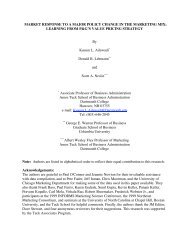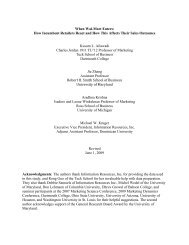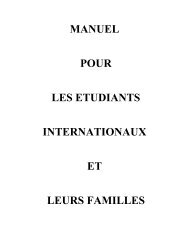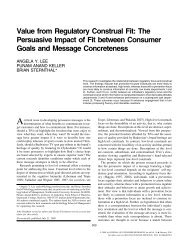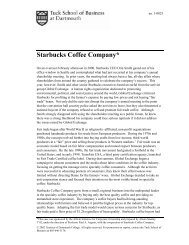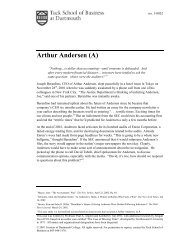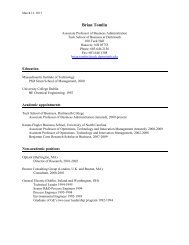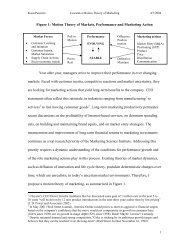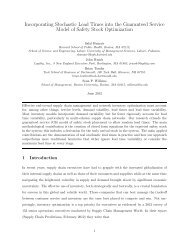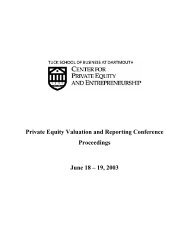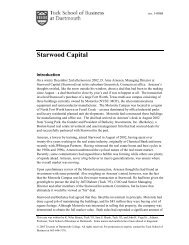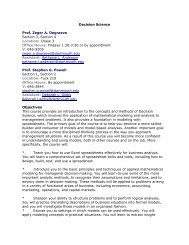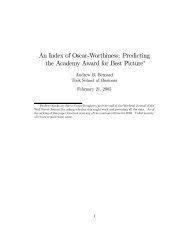tax notes international - Tuck School of Business - Dartmouth College
tax notes international - Tuck School of Business - Dartmouth College
tax notes international - Tuck School of Business - Dartmouth College
You also want an ePaper? Increase the reach of your titles
YUMPU automatically turns print PDFs into web optimized ePapers that Google loves.
Switzerland<br />
France<br />
Execution <strong>of</strong><br />
contracts<br />
The French <strong>tax</strong> authorities’ arguments were overruled<br />
by the Court <strong>of</strong> Appeals <strong>of</strong> Paris because the<br />
activities carried out by Interhome Gestion were legally<br />
different from those <strong>of</strong> Interhome AG and the former<br />
did not have legal authority to bind the latter. 27<br />
Later on, the case was brought before the Supreme<br />
Administrative Court, which held that Interhome Gestion<br />
would only constitute a PE <strong>of</strong> its parent company<br />
if the requirements <strong>of</strong> article 5 <strong>of</strong> the France-<br />
Switzerland treaty, equivalent to article 5(5) <strong>of</strong> the<br />
OECD model, were met. In other words, such characterization<br />
would only occur if Interhome Gestion<br />
could not be considered an independent agent and if it<br />
habitually exercised in France an authority, legal or<br />
factual, to conclude contracts in the name <strong>of</strong> Interhome<br />
AG that relate to ordinary business activities <strong>of</strong><br />
that company. 28 Therefore, the Supreme Administrative<br />
Court maintained the core part <strong>of</strong> the decision <strong>of</strong> the<br />
Court <strong>of</strong> Appeals <strong>of</strong> Paris, rejecting the characterization<br />
<strong>of</strong> Interhome Gestion as a PE <strong>of</strong> its parent company.<br />
Despite this outcome (that is, no characterization <strong>of</strong><br />
the subsidiary as being a PE <strong>of</strong> its parent company),<br />
the relevance <strong>of</strong> this case to the present analysis is that<br />
the Supreme Administrative Court <strong>of</strong> France clearly<br />
described the requirements by which a subsidiary<br />
might constitute a PE <strong>of</strong> its parent company, emphasizing<br />
the possibility <strong>of</strong> a subsidiary binding de facto<br />
its parent company and not only legally. According to<br />
27<br />
Court <strong>of</strong> Appeals <strong>of</strong> Paris, decision 96-859 2e (released<br />
June 13, 2000).<br />
28<br />
Klaus Vogel in cooperation with the IBFD’s Tax Treaty<br />
Unit, ‘‘1. Subsidiaries as Permanent Establishments?’’ Bulletin —<br />
Tax Treaty Monitor, Tax Treaty News (Oct. 2003), p. 474.<br />
Figure 1. Interhome<br />
Interhome AG<br />
Interhome<br />
Gestion<br />
SPECIAL REPORTS<br />
Other European States<br />
Mandate contracts with<br />
house owners<br />
Payment <strong>of</strong> commission on<br />
the rents<br />
the Conseil d’Etat, the exercise <strong>of</strong> the authority to bind<br />
the Swiss parent should be determined not only by reference<br />
to a legal mandate, but also by reference to the<br />
actual circumstances.<br />
This factual approach adopted by the Conseil d’Etat<br />
would prove to be decisive in a later case — Zimmer —<br />
analyzed below, that was heavily criticized by some<br />
scholars.<br />
B. Philip Morris<br />
The importance <strong>of</strong> the Philip Morris case29 to the<br />
present work resides not only in that it involves a dependent<br />
agent that is a subsidiary <strong>of</strong> its principal, but<br />
also, and most important, because <strong>of</strong> the particular<br />
features envisaged by the Italian Supreme Court for the<br />
characterization <strong>of</strong> what it called a ‘‘multiple PE’’ — a<br />
PE within a group <strong>of</strong> companies.<br />
Philip Morris involves an audit carried out by the<br />
Italian <strong>tax</strong> authorities regarding the character <strong>of</strong> the<br />
activities performed by Intertaba SpA, the Italian company<br />
<strong>of</strong> the Philip Morris group, which was structured<br />
at the time <strong>of</strong> the facts as shown in Figure 2.<br />
The decision <strong>of</strong> the Supreme Court <strong>of</strong> Italy stated<br />
that because <strong>of</strong> the activities carried out by Intertaba<br />
SpA in supervising the performance <strong>of</strong> the licensing<br />
and distribution contracts concluded among the other<br />
companies <strong>of</strong> the Philip Morris group and its participation<br />
in negotiating such contracts, the company could<br />
be deemed to be a ‘‘place <strong>of</strong> management’’ at the disposal<br />
<strong>of</strong> the entire group. Intertaba SpA was then considered<br />
to constitute a ‘‘multiple subsidiary’’ PE in<br />
29 Italian Supreme Court, Dec. 20, 2001, decisions 3367 and<br />
3368; Italian Supreme Court, Dec. 20, 2001, decision 7682; and<br />
Italian Supreme Court, Dec. 20, 2001, decision 10925.<br />
TAX NOTES INTERNATIONAL FEBRUARY 2, 2009 • 425<br />
(C) Tax Analysts 2009. All rights reserved. Tax Analysts does not claim copyright in any public domain or third party content.



